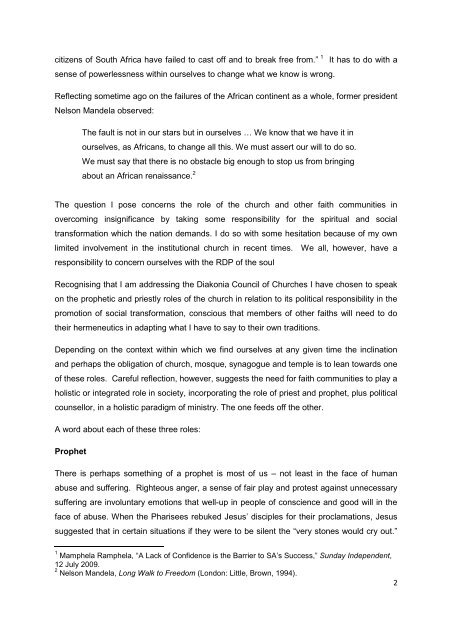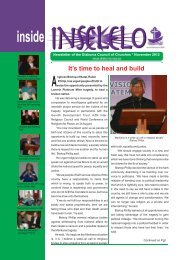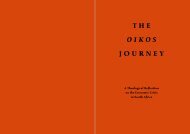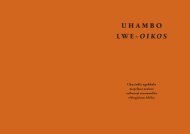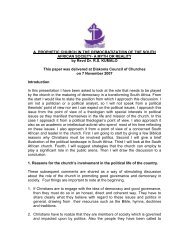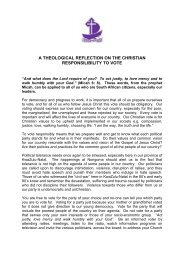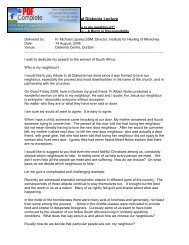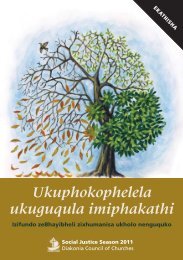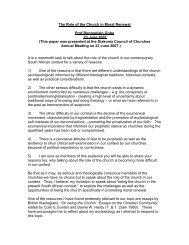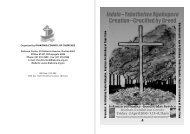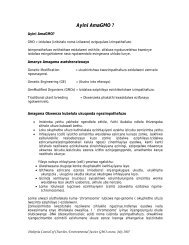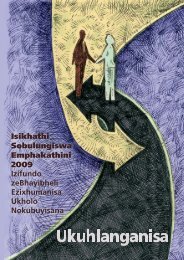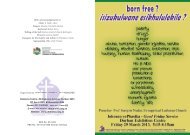The Church and Social Transformation - Diakonia Council of Churches
The Church and Social Transformation - Diakonia Council of Churches
The Church and Social Transformation - Diakonia Council of Churches
Create successful ePaper yourself
Turn your PDF publications into a flip-book with our unique Google optimized e-Paper software.
citizens <strong>of</strong> South Africa have failed to cast <strong>of</strong>f <strong>and</strong> to break free from.” 1 It has to do with a<br />
sense <strong>of</strong> powerlessness within ourselves to change what we know is wrong.<br />
Reflecting sometime ago on the failures <strong>of</strong> the African continent as a whole, former president<br />
Nelson M<strong>and</strong>ela observed:<br />
<strong>The</strong> fault is not in our stars but in ourselves … We know that we have it in<br />
ourselves, as Africans, to change all this. We must assert our will to do so.<br />
We must say that there is no obstacle big enough to stop us from bringing<br />
about an African renaissance. 2<br />
<strong>The</strong> question I pose concerns the role <strong>of</strong> the church <strong>and</strong> other faith communities in<br />
overcoming insignificance by taking some responsibility for the spiritual <strong>and</strong> social<br />
transformation which the nation dem<strong>and</strong>s. I do so with some hesitation because <strong>of</strong> my own<br />
limited involvement in the institutional church in recent times. We all, however, have a<br />
responsibility to concern ourselves with the RDP <strong>of</strong> the soul<br />
Recognising that I am addressing the <strong>Diakonia</strong> <strong>Council</strong> <strong>of</strong> <strong>Church</strong>es I have chosen to speak<br />
on the prophetic <strong>and</strong> priestly roles <strong>of</strong> the church in relation to its political responsibility in the<br />
promotion <strong>of</strong> social transformation, conscious that members <strong>of</strong> other faiths will need to do<br />
their hermeneutics in adapting what I have to say to their own traditions.<br />
Depending on the context within which we find ourselves at any given time the inclination<br />
<strong>and</strong> perhaps the obligation <strong>of</strong> church, mosque, synagogue <strong>and</strong> temple is to lean towards one<br />
<strong>of</strong> these roles. Careful reflection, however, suggests the need for faith communities to play a<br />
holistic or integrated role in society, incorporating the role <strong>of</strong> priest <strong>and</strong> prophet, plus political<br />
counsellor, in a holistic paradigm <strong>of</strong> ministry. <strong>The</strong> one feeds <strong>of</strong>f the other.<br />
A word about each <strong>of</strong> these three roles:<br />
Prophet<br />
<strong>The</strong>re is perhaps something <strong>of</strong> a prophet is most <strong>of</strong> us – not least in the face <strong>of</strong> human<br />
abuse <strong>and</strong> suffering. Righteous anger, a sense <strong>of</strong> fair play <strong>and</strong> protest against unnecessary<br />
suffering are involuntary emotions that well-up in people <strong>of</strong> conscience <strong>and</strong> good will in the<br />
face <strong>of</strong> abuse. When the Pharisees rebuked Jesus’ disciples for their proclamations, Jesus<br />
suggested that in certain situations if they were to be silent the “very stones would cry out.”<br />
1 Mamphela Ramphela, “A Lack <strong>of</strong> Confidence is the Barrier to SA’s Success,” Sunday Independent,<br />
12 July 2009.<br />
2 Nelson M<strong>and</strong>ela, Long Walk to Freedom (London: Little, Brown, 1994).<br />
2


